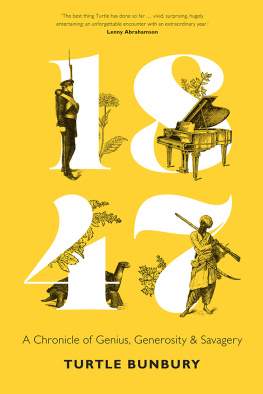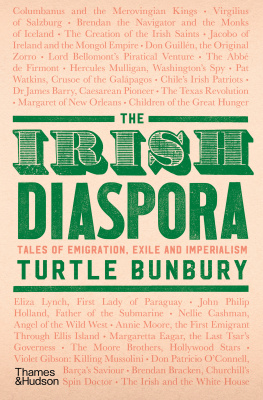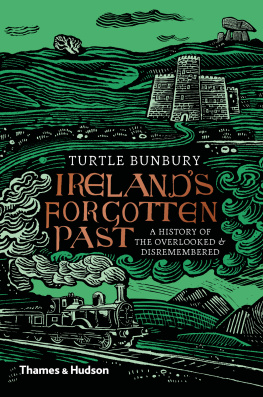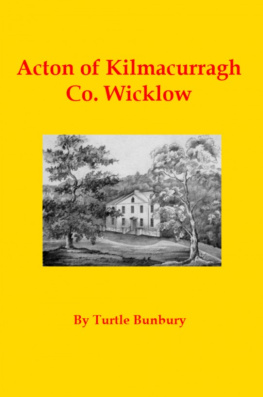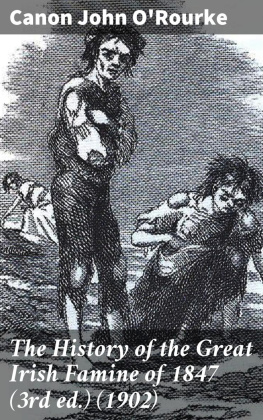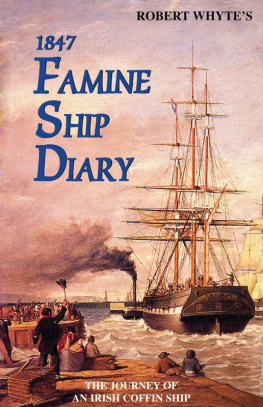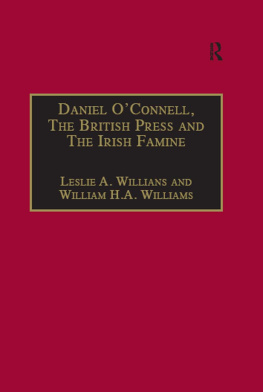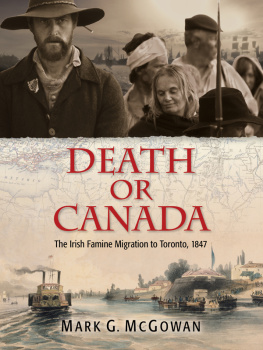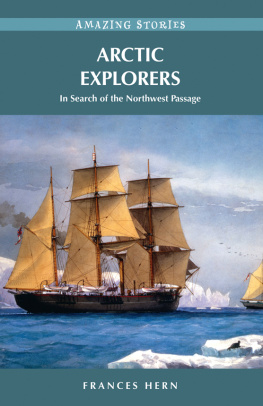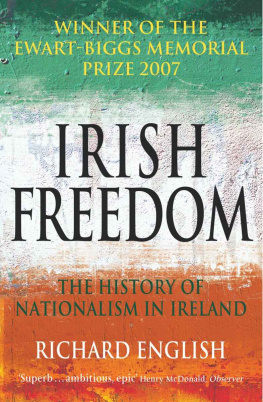1847
A CHRONICLE OF GENIUS,
GENEROSITY & SAVAGERY
TURTLE
BUNBURY
Gill Books
To my wonderful sister Sasha, who was by my side during that marvellous Mexican adventure when 1847 struck me head-on all those years ago, and who has serenely nudged me forward with this project ever since.
And to her equally magnificent husband, Tom, a Keeper of the Flame if ever there was one.
I also offer it as a thank you to my friends Herbie and Jacquie for the counsel, the banter, the lunches and the laughter.
Contents
INTRODUCTION
1847: The year it all began
I n the front of my car I keep a steel harmonica in order to whittle away the minutes on the rare occasions when I find myself idling through rush-hour traffic. I am by no means a skilled player what goes on in the car, stays in the car but I am grateful to the Seydel Shne harmonica factory of Klingenthal in Germany for sending me such a useful instrument. The company was founded in 1847, making it the oldest surviving harmonica manufacturer in the world, and it seems fitting that I should have one of their models in my car.
When my harmonica arrived in the post, it was accompanied by a simple song example to enable me to practise drawing, blowing and puckering on the holes. I was thrilled to note that the song they chose was Stephen Fosters Oh! Susanna, a veritable 1847 classic if ever there was one. I assumed the 1847 match-up was deliberate, until Lars Seifert, managing director at Seydel Shne, expressed such pleasant surprise when I asked him about it. To my mind, this was a typical moment of 1847 serendipity.
That year has followed me around for the best part of three decades now, and my affection for it knows no bounds. In my mind, there is no doubt that an inordinate number of curious, brilliant and dreadful events took place during those particular 12 months. 1847 was a year of immense discord that paved the way for so much human migration, territorial conquest and monarchy-toppling turmoil that the planet is arguably still recovering from it. And yet there was progress and harmony too, played out on pianos and banjos, on broadsheets and telegraphs, as our ever-shrinking world learned more about itself than it had ever known before.
My first awareness of it came while I was studying Emily Bronts Wuthering Heights for my English A-Level examination at Glenalmond, a boarding school in Scotland. It was noted that Bront had published her book in 1847, the same year that W.E. Gladstone, later to become the British Prime Minister, had founded our school. At about this time I came upon a silver trowel at Lisnavagh, my family home in County Carlow, Ireland, which revealed that the first granite stone of our house was laid on 23 January 1847.
Having been educated in Scotland, I didnt learn much about the Great Famine that tore Ireland apart during 1847. It was Christy Moores melodic voice that first really alerted me to the catastrophe when he sang The City of Chicago, written by his brother Luka Bloom. The first verse runs:
1847 was the year it all began.
Deadly pains of hunger
Drove a million from the land.
They journeyed not for glory,
Their motive was not greed,
A voyage of survival
Across the stormy sea.
I went to the books to learn more. The impact of the Famine was, of course, enormous. Can you name any other country in the world where the population today is pretty much half what it once was? The statistics are difficult to comprehend: in 1847 alone, some 400,000 men, women and children are believed to have died in consequence of the Famine, be it through disease or starvation, and nearly 250,000 fled, primarily to Britain and North America. Such a massive exodus inevitably had a huge bearing on the shape of things overseas. For instance, the population of Toronto in January 1847 was 20,000; by the close of the year it was 60,000, with the newcomers almost exclusively from Ireland.
With so many grim statistics to ponder, I found myself questioning why my forebears took it upon themselves to build a new mansion in a year that was to become known in Ireland as Black 47. (See Appendix 1.) And yet, while I have almost certainly said too little about the Great Famine in these pages, the purpose of this book is not to rake over the coals of that appalling era, which, even as I write, is replicated in the plight of so many luckless souls seeking to escape from their own tortured homelands amid the uncertainty of the present century.
What happened in Ireland during the 1840s was shocking, disgusting, heart-breaking and almost entirely indefensible. Its consequence was to totally restructure the psyche of the Irish people, both at home and abroad. It is my hope that some measure of the immensity of the calamity, and of the philanthropy it generated, will be discernible in these pages in the effect, great and small, it had on such an anomalous group as General Tom Thumb, the Choctaw Indians, the Cape Cod fishermen, the Sultan of the Ottoman Empire and the opium-running merchants of Boston, Massachusetts.
If there are any positives to be found in the crisis that blitzed Ireland in the 1840s it is that so many people all over the world put such a noble effort into trying to make things better.
With the arrival of so many sickly and destitute Irish refugees in Canada and the United States, it is small wonder that many other settlers opted to push west in 1847 in pursuit of less congested lands. That said, the Irish Famine does not appear to have influenced the decision of the Mormons to set off on their epic voyage to Salt Lake City, or indeed that of the German colonists who set up their liberal commune at the heart of Comanche territory in Texas, or of those who began planting their vineyards in South Australia.
In a year when the worlds population stood at approximately 1.25 billion, people were on the march at almost every latitude. The citizens of Europe were, by and large, making the trek from the countryside to the cities, where the Industrial Revolution was continuing apace. However, many more were making their way to the distant continents of Australia, Africa and the Americas to start anew.
Some even ventured north to the Arctic, but, as the British explorer Sir John Franklin discovered, the northern climes were ill-suited to human survival. Franklins expedition to the Northwest Passage is an event we have long known about in our family, because one of our forebears was involved in the quest to discover the unfortunate mans fate. However, it was only when I began reading on the subject in detail that I discovered that Franklins life had also concluded in 1847.
As I say, the year has followed me around. I see it on Carlsberg cans, on Jacobs Creek bottles, on my 24-hour clock in the early evening. I live in rural Ireland, but I cannot look at a Massey Ferguson tractor without recalling how Daniel Massey started out making threshers in Ontario in 1847. When I remind my young daughters to wash their hands after they have been to the bathroom, my mind wanders to poor old Ignaz Semmelweis and his campaign to persuade doctors to wash their hands, which began in 1847. When I attended the 2015 Web Summit, I could not resist telling all those code-busting internet whizzes about how San Franciscos streetscape was laid out in 1847 by an Irish surveyor named Jasper OFarrell.
I think the clearest indication of my magnetic attraction for 1847 took place when I chanced to be staying in San ngel, a suburb of Mexico City, in the winter of 2001. I had tired of trying to teach my hosts parrot how to say feck and decided to go for a walk. I could have gone in any direction, but my feet escorted me this way and that until they reached a cobblestone plaza, where they halted in front of a marble monument. My Spanish is still dreadful, but even then it was clear that this was a memorial to 71 soldiers, mostly Irish, who had died fighting for Mexico against the United States in the year of Our Lord, 1847. I give my account of the San Patricios in these pages, but I can tell you here and now that stumbling upon that memorial was probably the moment when I decided that this book would one day have to be written.

